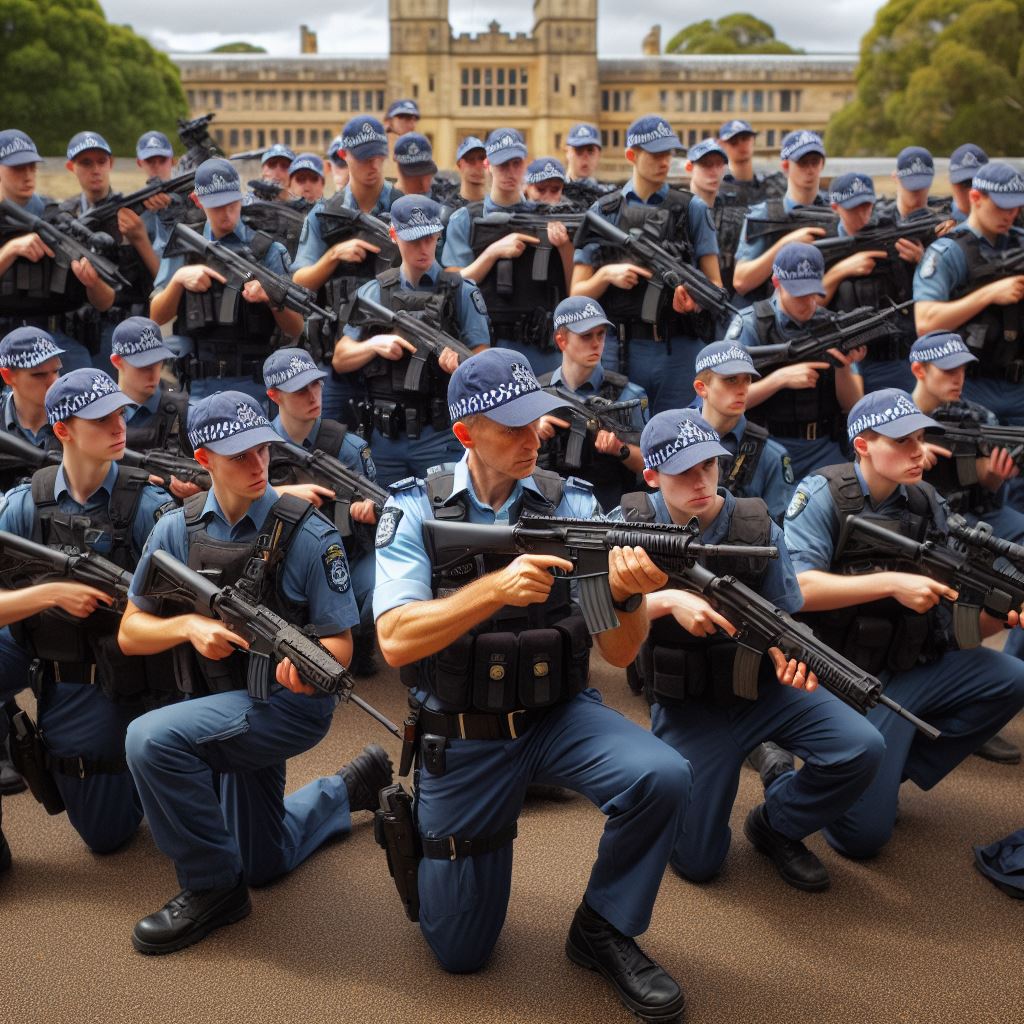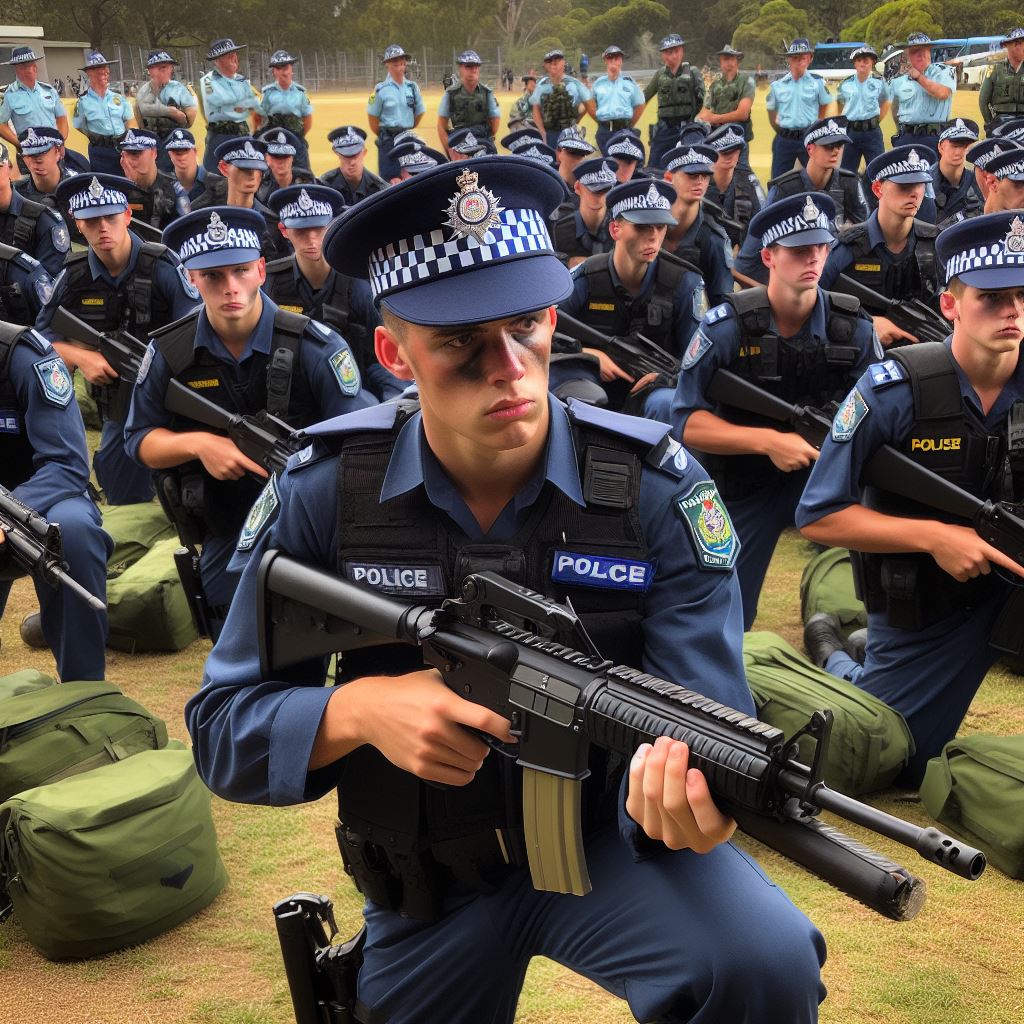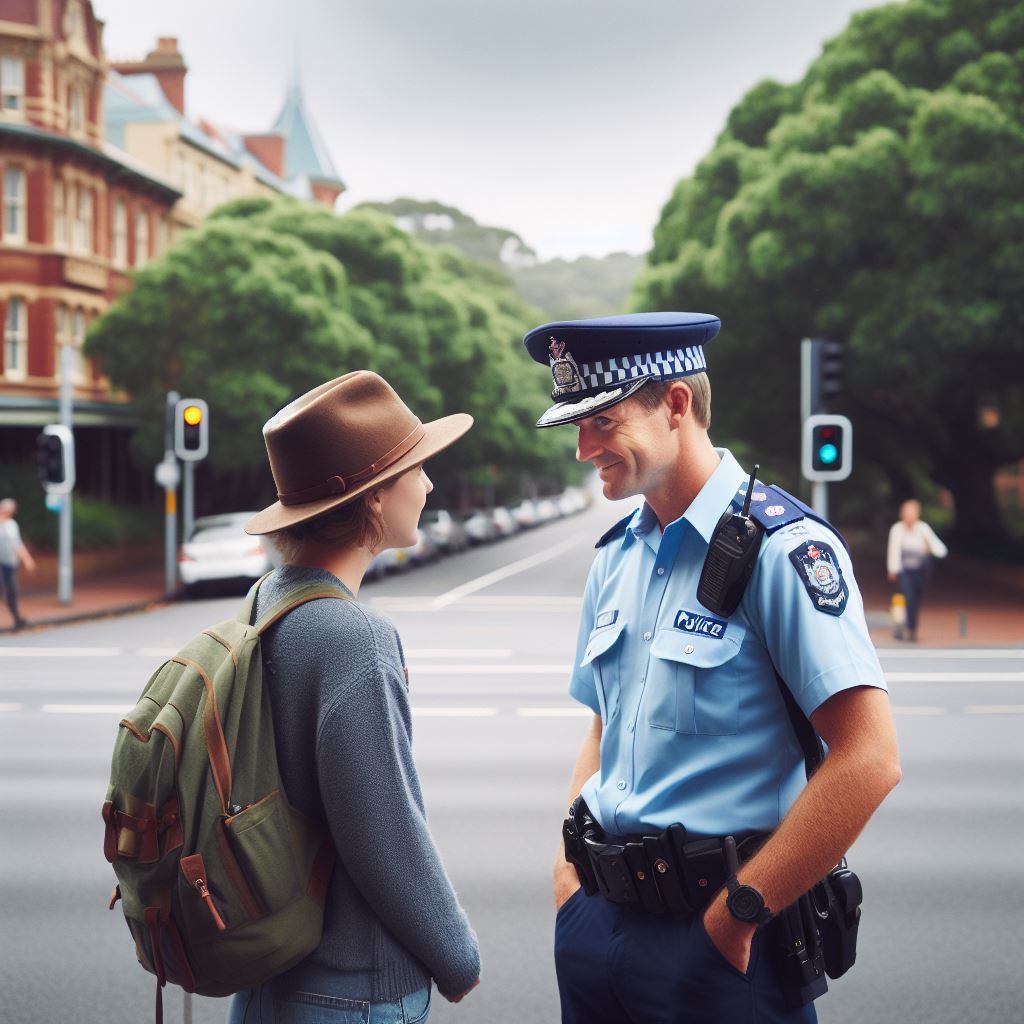Introduction
A. Embarking on a Law Enforcement Journey in Australia
Becoming a police officer in Australia opens doors to a dynamic career, where dedication and resilience thrive.
Police officers play a pivotal role in maintaining societal order, ensuring safety, and upholding justice.
Their impact echoes through communities, fostering trust and security.
- Joining the police force offers a chance to serve and protect, creating a safer environment.
- Australian police officers actively engage in crime prevention, investigation, and community outreach.
- The rigorous recruitment process demands physical fitness, mental agility, and a commitment to ethical standards.
- Training programs cover a spectrum of skills, from firearms proficiency to conflict resolution.
- As a police officer, one becomes a beacon of authority, representing justice and embodying the values of integrity and courage.
Embark on this transformative journey, where each step molds you into a guardian of peace and a pillar of the community.
Requirements and Eligibility
A. Basic Requirements
- Australian Citizenship: Applicants must be Australian citizens or have permanent residency.
- Character Assessment: Candidates need to undergo a thorough character and background assessment.
- Physical Fitness: The job requires a good level of physical fitness, so applicants must meet fitness standards.
- Driver’s License: A valid driver’s license is essential to perform police duties effectively.
B. Educational Qualifications and Minimum Age Requirements
- Minimum Age: The minimum age to apply for the police force is usually 18 years, although this can vary by state.
- Education: A high school diploma or equivalent is generally required for entry-level positions.
- Further Education: Some states may require additional education, such as an associate’s or bachelor’s degree.
C. Specific Skills or Attributes Desired in Candidates
- Communication Skills: Police officers need strong communication skills to effectively interact with the public and colleagues.
- Problem-Solving Abilities: The ability to think critically and solve problems is crucial in law enforcement.
- Teamwork: Police officers often work in teams, so the ability to work collaboratively is essential.
- Leadership Potential: Candidates with leadership qualities are highly regarded as they may progress to higher ranks.
- Ethical Conduct: Upholding ethical standards and demonstrating integrity is fundamental in the police force.
Becoming a police officer in Australia requires meeting certain requirements, including Australian citizenship, passing character assessments, and maintaining physical fitness.
Additionally, minimum educational qualifications and a driver’s license are necessary.
Candidates with strong communication, problem-solving, teamwork, leadership potential, and ethical conduct are highly sought after.
If you aspire to join the force, ensure that you fulfill the necessary criteria and possess the desired attributes.
Recruitment Process
When it comes to becoming a police officer in Australia, there are several stages in the recruitment process you need to go through:
A. Initial Application and Assessment Stage
- Submit your application online or in person, including relevant documents and your personal information.
- Undertake a written exam to assess your knowledge and understanding of key police procedures and laws.
- Take part in a physical agility test to evaluate your fitness levels and ability to handle physical tasks.
- Participate in an interview to discuss your motivations, skills, and suitability for the role.
- Provide references from previous employers or individuals who can vouch for your character.
B. Physical Fitness Tests and Medical Examinations
- Engage in a series of physical fitness tests, such as running, push-ups, sit-ups, and vertical jumps.
- Undergo medical examinations to ensure you are in good health and capable of performing police duties.
- These tests and examinations are crucial as they determine your physical ability to handle the demands of the job.
C. Background Checks and Interviews
- Undergo thorough background checks to verify your personal, employment, and educational history.
- These checks include criminal record checks, credit history checks, and social media screenings.
- Attend one or more interviews with a panel of assessors who will assess your suitability for the role.
- In the interviews, you may be asked behavioral questions to gauge your problem-solving skills and decision-making abilities.
D. Psychological Assessments and Final Assessment
- Undergo psychological assessments to evaluate your mental well-being, stability, and resilience.
- These assessments often involve completing written tests and engaging in interviews with trained psychologists.
- After successfully passing all the previous stages, you will go through a final assessment.
- This assessment may include team exercises, role-playing scenarios, and group discussions to assess your suitability for the role.
- Upon successful completion of all the stages, you will be offered a place in the police academy.
E. Police Academy Training
- Once accepted, you will undergo comprehensive training at the police academy, covering various aspects such as law, community engagement, and physical training.
- Training programs can span from several months to over a year, depending on the specific police force and its requirements.
- During this training period, you will learn essential skills, undergo practical simulations, and gain the necessary knowledge to become a successful police officer.
It’s important to note that the recruitment process for becoming a police officer in Australia may vary slightly between states and territories.
However, the general stages discussed above provide a comprehensive overview of what to expect.
Read: Understanding Ranks in Australian Police Force
Training and Education
When it comes to becoming a police officer in Australia, training and education play a crucial role.
Police academies in Australia provide comprehensive training programs to prepare individuals for this noble profession.
A. Training Programs
- The Australian police academies offer a range of training programs to aspiring police officers.
- These programs are designed to equip individuals with the necessary knowledge, skills, and abilities to perform their duties effectively.
- Some of the key training programs include the Police Recruit Training Program and the Police Officer Training Program.
- These programs are tailored to cater to the specific needs and requirements of different types of police officers.
B. Duration and Content
- The duration of the training courses offered by police academies varies depending on the specific program.
- The Police Recruit Training Program typically lasts for around 24 weeks.
- During this period, recruits undergo intensive training in various subjects such as criminal law, police procedures, and community policing.
- The Police Officer Training Program, on the other hand, is a more advanced course that focuses on leadership, investigation techniques, and specialized skills.
- This program generally lasts for around 12 to 24 months.
C. Importance of Practical Training and Simulations
In addition to classroom-based learning, practical training and simulations play a vital role in the training of police officers in Australia.
- Practical training allows recruits to apply the theoretical knowledge they have gained in real-life scenarios.
- Through scenario-based exercises and simulations, recruits learn how to handle emergencies, make quick decisions, and work as a team.
- This hands-on training helps develop essential skills such as communication, problem-solving, and critical thinking.
- Practical training also exposes recruits to the physical and psychological challenges faced by police officers.
D. Additional Training and Specializations
- Once recruits complete their initial training, there are various opportunities for additional training and specializations.
- Police officers can choose to specialize in fields such as forensics, traffic, canine units, counter-terrorism, or community policing.
- These specializations provide officers with the opportunity to develop expertise in their chosen area.
- Additional training programs are available throughout an officer’s career to ensure they stay up-to-date with the latest techniques, technologies, and legal developments.
In review, the training and education provided by police academies in Australia are essential for individuals aspiring to become police officers.
The comprehensive training programs, practical exercises, and specialization options prepare officers to handle the complex and demanding role of maintaining law and order in society.
Read: Day in the Life of an Aussie Police Officer

Career Prospects and Advancement
A. The career prospects for police officers in Australia
- The demand for police officers in Australia is steady, providing good job security.
- There are various employment opportunities across state and federal police agencies.
- The role of a police officer offers a chance to serve the community and make a positive impact.
B. The potential for advancement within the police force
- Police officers can advance their careers through promotions and specializations.
- Advancement opportunities exist at different hierarchical levels within the police force.
- Dedicated and skilled officers can progress to higher positions of responsibility and leadership.
C. Various specialized units or roles that officers can pursue
- Police officers can join specialized units such as the canine unit, mounted police, or tactical response teams.
- Other specialized roles include detectives, traffic police, and forensic specialists.
- Specialized units allow officers to develop specific skills and contribute to specific areas of law enforcement.
D. Opportunities for promotion or higher ranks
- After gaining experience, police officers can apply for promotion to higher ranks such as sergeant, inspector, or superintendent.
- Promotions are typically based on performance, skills, and qualifications.
- Higher ranks come with increased responsibilities, leadership roles, and a higher level of authority.
E. Advancement in the police force requires dedication, continuous learning, and commitment to professional development
- Police officers can enhance their career prospects by pursuing further education, such as advanced law enforcement courses or degrees in criminology.
- Specialized training programs offered by police academies and agencies can also contribute to career advancement.
- Building a strong professional network within the police force and engaging in community activities can open doors to promotional opportunities.
- Developing leadership skills and demonstrating integrity and ethical conduct are crucial for advancement.
- Police officers should be proactive in seeking out opportunities for career growth and advancement by taking on challenging assignments and demonstrating exceptional performance.
In short, becoming a police officer in Australia offers promising career prospects. The demand for officers remains steady, providing job security.
Advancement within the police force is possible through promotions to higher ranks and specialized units.
Your Personalized Career Strategy
Unlock your potential with tailored career consulting. Get clear, actionable steps designed for your success. Start now!
Get StartedOpportunities for career growth can be pursued through continuous learning, professional development, and networking.
The police force in Australia provides a range of career options, allowing officers to contribute to various areas of law enforcement while making a positive difference in the community.
Read: Diplomatic Immunity: The Basics
Challenges and Rewards
In a career as a police officer in Australia, individuals face a range of challenges that require mental and physical resilience.
However, the rewarding aspects of serving the community and maintaining law and order make it an honorable profession.
A. Challenges faced by police officers in Australia
- High-risk situations: Police officers often find themselves in dangerous and unpredictable circumstances.
- Violent encounters: Dealing with aggressive individuals requires quick thinking and appropriate use of force.
- Emotional stress: Witnessing and responding to trauma can have long-lasting effects on mental health.
- Shift work: Irregular hours and night shifts can disrupt sleep patterns and social life.
- Workplace pressure: Police officers are expected to make split-second decisions with potentially life-altering consequences.
B. The importance of mental and physical resilience
Overcoming these challenges requires police officers to possess both mental and physical resilience.
- Mental resilience enables officers to deal with stressful situations while maintaining composure and making rational decisions.
- Physical resilience allows officers to endure the physical demands of the job, including foot pursuits and restraining suspects.
- Regular physical fitness training and mental well-being practices are essential for maintaining these qualities.
C. Rewarding aspects of the career
Despite the challenges, a career as a police officer in Australia offers many rewarding aspects:
- Serving the community: Every day, officers contribute to making their communities safer and protecting its residents.
- Maintaining law and order: Officers play a vital role in upholding the rule of law and ensuring justice is served.
- Variety of experiences: No two days are the same, and each day presents new opportunities to make a positive impact.
- Professional development: The police force provides numerous training and promotional opportunities.
- Job security: With the demand for law enforcement, the career offers stability and growth potential.
- Team camaraderie: Police officers forge strong bonds with their colleagues, creating a network of support.
In fact, becoming a police officer in Australia comes with its share of challenges; however, the profession also offers numerous benefits and rewards.
Mental and physical resilience are crucial in dealing with the difficulties officers face.
By serving the community and maintaining law and order, police officers make a meaningful contribution to society.
The honor and satisfaction derived from this career make it an appealing choice for those willing to accept the challenges and embrace the rewards.
Read: Crisis Management in Diplomacy
Conclusion
Becoming a police officer in Australia requires dedication, perseverance, and meeting certain requirements.
The process involves completing education, passing physical and psychological tests, and obtaining the necessary certifications.
It is a challenging career that demands courage, integrity, and a strong commitment to public service.
To become a police officer in Australia, individuals must be Australian citizens or permanent residents, be at least 18 years old, and have a valid driver’s license.
They must also undergo a comprehensive background check and meet certain physical and fitness standards.
The steps to becoming a police officer include completing the necessary education, such as obtaining a diploma or degree in policing or criminal justice.
This is followed by applying to a police force and undertaking a rigorous selection process, which includes interviews, written exams, and physical assessments.
Once accepted into a police academy, individuals undergo intense training to develop the necessary skills and knowledge required for the role.
This training covers various areas, including law enforcement procedures, criminal investigations, conflict resolution, and community relations.
Stand Out with a Resume That Gets Results
Your career is worth more than a generic template. Let us craft a resume and cover letter that showcase your unique strengths and help you secure that dream job.
Get HiredBecoming a police officer in Australia offers a rewarding career that allows individuals to serve and protect their community.
It provides opportunities for personal and professional growth, as well as the chance to make a positive impact on society.
If you have a passion for law enforcement and a strong commitment to upholding justice, then pursuing a career as a police officer in Australia may be the right path for you.
Embrace the challenges, push yourself to excel, and embark on a fulfilling journey to serve and protect your community.




